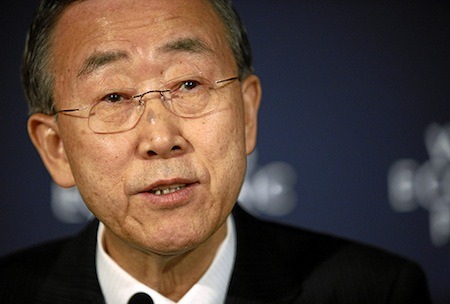UPDATES
UNESCO vote on Palestine triggers UN backlash
November 7, 2011 | Or Avi Guy

The acceptance of the Palestinian Authority (PA) to the United Nations Educational, Scientific and Cultural Organization (UNESCO) was criticised within the UN by none other than the Secretary General Ban Ki Moon.
In an interview during the G20 summit in Cannes, France, he warned against further attempts by the Palestinians to join other UN bodies and agencies and stated that such efforts are “not beneficial for Palestine and not beneficial for anybody.” He warned that “millions and millions” of people could be affected if UN agencies suffer budget cuts as a result of the Palestinian bids: “This will have implications for all the agencies of the United Nations. When an organisation is not properly functioning because of a lack of resources, you have to think about the millions and millions of people who are being impacted and affected,” he said.
Ban’s concerns are based on actions by the United States and Canada, which contributed 25% of UNESCO’s funding, and have cut off their funding following the PA vote.
The success of the Palestinian bid at UNESCO led the US to stop its funding to the organisation in accordance with US law, which prohibits contributions to organisations that grant membership to territories which are not internationally recognised states. Spokesperson for the US State Department, Victoria Nuland, added that the vote at UNESCO is “regrettable” and compromises the common goal of peace between Israel and the Palestinians. However, the US will remain a member of UNESCO.
The Canadian Foreign Minister John Baird stated that accepting the PA as a member state of UNESCO will not contribute to the peace efforts between Israel and the Palestinians and that his government is displeased by the vote. “We are concerned by the resolution in UNESCO,” Baird said, “we believe both sides ought to negotiate in order to reach a peace agreement and should not take unilateral actions in international organizations.” Canada will not cut down on the contributions it has already committed to make, but will freeze all future contributions.
UNESCO Director General, Irina Bokova, responded to the budget cuts by releasing a statement in which she said, “I call on the US administration, Congress and the American people to find a way forward and continue support for UNESCO in these turbulent times.”
While initially the head of the Palestinian delegation to the UN in Geneva said that the PA is encouraged by the majority it received in the vote of full state membership in UNESCO, and therefore intended to submit applications for full membership in 16 different UN agencies (including the World Health Organization (WHO) and the World Trade Organization (WTO), this is now changing in light of the growing criticism.
Palestinian Foreign Minister Riyad al-Malki announced in a press conference in Ramallah that the PA would not pursue admission to additional UN agencies at this time, and would focus its efforts on its UN Security Council and the bid for full membership at the UN.
Other Palestinian officials were less affected by the Secretary General’s criticism and warnings. Saeb Erekat responded to Ban’s statements by arguing that the root of the problem is not the Palestinian bids, but rather US legislation: “I think it would be easier for Mr Ban Ki-moon to ask the Congress to change their laws. I don’t think Palestine’s admittance to any of these agencies will bring harm.”
The Secretary General was not the only diplomat with reservations regarding the Palestinian efforts in UN agencies. According to reportedly widespread criticisms at the UN headquarters, some agencies seem to exhibit excessive independence, a tendency which becomes especially problematic in regards to initiatives directly related to pressing and divisive issues which are being discussed in the UN. Such overly-independent agencies include the Human Rights Committee and UNESCO – both often criticised for their voting patterns and underlying agendas.
Senior diplomats also noted several significant precedents and complexities in the UNESCO vote. The move constitutes the first time any UN branch has recognised Palestine as a full member of the international body. “This is a problematic move that may cause a snowball effect, which will be difficult to stop”, said an official from a Western delegation. “Every agency and organization is its own entity with laws and regulations its own, and usually operate outside of the United States – a fact that makes it difficult to influence any move they make”, said the official, adding that “the Palestinians are requesting membership and representation in the UN in order to hurt, humiliate and isolate Israel.”
Another problematic aspect of the UNESCO membership, according to diplomats, is that member states of any UN agency must comply with the agency’s conventions. An agreement to UNESCO Conventions must be passed by a parliamentary body which represents that nation and state. However, in the PA’s case, Hamas’ rule in the Gaza Strip presents a challenge toward meeting this condition. There is no united PA parliament which could ratify the conventions.
Furthermore, diplomats argued that the PA’s status as a UNESCO member will not advance its attempt to reach a majority vote in the UN Security Council in its statehood bid, since there are other member states, other than the US, which do not support UN agencies’ one-sided recognition of the PA, while other members in the Security Council are likely to oppose acts which are seen as openly defying the authority of the Security Council, such as the UNESCO vote.
Or Avi-Guy
Tags: Palestinians





